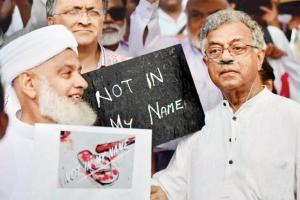Apart from his vociferous activism, a great way to know the actor-director-playwright is through a short doc by KM Chaitanya

Girish Karnadu00e2u0080u0099s last defining image is of course the one from the street, holding an anti-hate placard, with his nostrils wrapped in an oxygen tube
 Girish Karnad (1938-2019) was known to brilliantly derive from Indian mythology, history and folklore, scripts that still made for the most relatable/contemporary plays. His major concern though, that he often articulated, is that Indians show scant regard for preserving and recording their own heritage.
Girish Karnad (1938-2019) was known to brilliantly derive from Indian mythology, history and folklore, scripts that still made for the most relatable/contemporary plays. His major concern though, that he often articulated, is that Indians show scant regard for preserving and recording their own heritage.
ADVERTISEMENT
This grouse might just as well be true for his life. You figure this, reading pages after pages of his obituaries. And yet these accounts, while generously listing his works, reveal so little about the man behind them. And by that I mean delicious anecdotes or untold stories from peers that make for the best form of oral history anyway.
In that sense, K M Chaitanya’s 26-minute documentary on Karnad, available on YouTube, produced by Sahitya Akademi, digging deeper into his early influences, probably does better justice than anything I have read/watched lately. A child prodigy of sorts, studying in Karnataka College, Karnad reveals in the film that he basically wished to study abroad. But he wouldn’t gain scholarship, without a first-class degree. Scoring that high was harder to do if he took up subjects that he actually enjoyed — history, or languages (English/Kannada). So he graduated in mathematics instead. And, in fact, topped the university, picked up the Rhodes scholarship, sailed to England, and subsequently became President of the Oxford Union (world’s top debating society).
That a creative, multilingual polymath can be this good at math destroys at once that left-brain/right-brain myth for all. Also, you have to give it to young Karnad’s incredible self-belief/confidence that he had decided to be an English poet—along the lines of Eliot and Auden—aiming for a Nobel Prize in literature, a reasonable aspiration for him at the time. That he began writing a play instead was purely by accident, he says. It was mainly inspired by the robust literary culture of his hometown Dharwar—chiefly championed by the local, Kannada journal Manhohar Granthmala, which published his first work. I’m not sure if Karnad pursued his initial passion as seriously thereafter.
But maybe there lies the seed of his supposedly controversial statement about Rabindranath Tagore few years back, when he called Gurudev a fine poet, of course, but a “second grade playwright.” Or maybe it was simply in his nature to say it the way he felt/saw it.
It’s something he practised as a public intellectual every so often—whether taking on Naipaul over a blindsided view of Muslim rule in India, or defending student leader Kanhaiya Kumar against blind hatred being perpetrated on JNU campus. His last defining image is of course the one from the street, holding an anti-hate placard, with his nostrils wrapped in an oxygen tube.
Karnad’s contemporary Satyajit Ray considered activism as too “unaesthetic”. I was once awe-struck observing Karnad take on detractors among the audience at a literature festival in Lucknow (Uttar Pradesh). He could aggressively tackle political/historical canards.
How he made time to pursue so many professions simultaneously—as an actor, director, playwright, thinker, and administrator—beats me most. No point listing his résumé. There is enough work under each individual header to rival a lifetime’s worth.
A headline that went viral on the Internet, upon his demise, called him an actor from Tiger Zinda Hai. It would have pleased him no doubt. His range was simply that astounding. Everyone will have their favourites from his output, among so many separate compartments.
Just so mine doesn’t clash with others’ (and for no other reason at all), I’m happy to single out his work as screenwriter of Shyam Benegal’s Kalyug (1981). One of the finest connoisseurs of films I know still pines to revisit Karnad’s Godhuli (1977), decades since he saw it first. I’ve been trying to trace a copy for a few years now, without any luck so far.
Of course, listening to online academic tutorials/lectures on his works, I’m also dying to watch Tughlaq on stage—the play that made Karnad a national phenomenon at age 26! So far I’ve only heard actor Nawazuddin Siddiqui deliver before me a crackling monologue from Tughlaq. Yeah, Nawaz is that same guy who said no to working on Tiger Zinda Hai—among his other accomplishments, of course!
The best anecdote from Chaitanya’s short-doc on Karnad is the bit where the artist says that his mother had decided on abortion when she was two months pregnant with him. His parents decided to visit the local doctor. As it turns out, the doctor wasn’t in on that day. It was then that his mother changed her mind.
When this story was revealed to Karnad at a later age, he was totally in shock.
He said, “I felt completely blank…. For about five minutes, the notion that the whole world could exist, and that I could not be there in it, just completely stunned me.”
That’s true now. His legacy, of course, will live on forever.
Mayank Shekhar attempts to make sense of mass culture. He tweets @mayankw14
Send your feedback to mailbag@mid-day.com
The views expressed in this column are the individual’s and don’t represent those of the paper
 Subscribe today by clicking the link and stay updated with the latest news!" Click here!
Subscribe today by clicking the link and stay updated with the latest news!" Click here!






